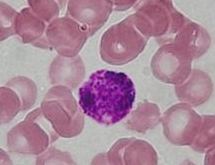Basophil
Basophils are a type of white blood cell and are classified under granulocytes, which are characterized by the presence of granules in their cytoplasm. Basophils are the least common of the granulocytes, comprising about 0.01% to 0.3% of circulating white blood cells. Despite their low numbers, they play a crucial role in the immune response, especially in inflammation and allergic reactions.
Morphology and Function[edit | edit source]
Basophils are round cells, approximately 12–15 micrometers in diameter, with a segmented nucleus. They are filled with large, coarse, bluish-black granules which obscure the nucleus. These granules contain:
- Histamine: A compound that increases blood flow to the affected area, leading to the common symptoms of an allergic reaction such as redness, heat, and swelling.
- Heparin: An anticoagulant that prevents blood from clotting too quickly.
- Leukotrienes: Lipids that mediate inflammatory responses.
The primary function of basophils is to participate in the body's immune response against parasites, especially parasitic worms. They also have a significant role in allergic reactions, asthma, and other inflammatory conditions. When an allergen enters the body, basophils release their granular contents into the bloodstream, leading to the symptoms of an allergic reaction.
Development[edit | edit source]
Basophils develop from stem cells in the bone marrow. The process, known as hematopoiesis, involves several stages of differentiation. Once mature, basophils leave the bone marrow and enter the bloodstream, where they circulate for a few hours before migrating into tissues throughout the body.
Clinical Significance[edit | edit source]
Abnormal basophil levels can be an indication of various diseases:
- Basophilia (increased basophil count): Can be seen in myeloproliferative disorders, such as chronic myeloid leukemia, and in some forms of inflammatory conditions like rheumatoid arthritis.
- Basopenia (decreased basophil count): Less commonly noted but can occur with hyperthyroidism, acute infections, and after a severe allergic reaction.
Interactions with Other Cells[edit | edit source]
Basophils interact with other immune cells like T cells. They can present antigens to T cells and secrete cytokines that regulate the function of these and other immune cells.
See also[edit | edit source]
- Granulocytes
- White blood cell
- Mast cell - Another cell type involved in allergic responses.
External links[edit | edit source]
- Basophil Information - American Society of Hematology
- International Immunology Foundation - Comprehensive information on immune cells.
| This article is a medical stub. You can help WikiMD by expanding it! | |
|---|---|
| Myeloid blood cells and plasma | ||||||
|---|---|---|---|---|---|---|
|
| Lymphocytic adaptive immune system and complement | ||||||||||||||||
|---|---|---|---|---|---|---|---|---|---|---|---|---|---|---|---|---|
|
Transform your life with W8MD's budget GLP1 injections from $125
W8MD offers a medical weight loss program NYC and a clinic to lose weight in Philadelphia. Our W8MD's physician supervised medical weight loss centers in NYC provides expert medical guidance, and offers telemedicine options for convenience.
Why choose W8MD?
- Comprehensive care with FDA-approved weight loss medications including:
- loss injections in NYC both generic and brand names:
- weight loss medications including Phentermine, Qsymia, Diethylpropion etc.
- Accept most insurances for visits or discounted self pay cost.
- Generic weight loss injections starting from just $125.00 for the starting dose
- In person weight loss NYC and telemedicine medical weight loss options in New York city available
- Budget GLP1 weight loss injections in NYC starting from $125.00 biweekly with insurance!
Book Your Appointment
Start your NYC weight loss journey today at our NYC medical weight loss, and Philadelphia medical weight loss Call (718)946-5500 for NY and 215 676 2334 for PA
Search WikiMD
Ad.Tired of being Overweight? Try W8MD's NYC physician weight loss.
Semaglutide (Ozempic / Wegovy and Tirzepatide (Mounjaro / Zepbound) available. Call 718 946 5500.
Advertise on WikiMD
|
WikiMD's Wellness Encyclopedia |
| Let Food Be Thy Medicine Medicine Thy Food - Hippocrates |
Translate this page: - East Asian
中文,
日本,
한국어,
South Asian
हिन्दी,
தமிழ்,
తెలుగు,
Urdu,
ಕನ್ನಡ,
Southeast Asian
Indonesian,
Vietnamese,
Thai,
မြန်မာဘာသာ,
বাংলা
European
español,
Deutsch,
français,
Greek,
português do Brasil,
polski,
română,
русский,
Nederlands,
norsk,
svenska,
suomi,
Italian
Middle Eastern & African
عربى,
Turkish,
Persian,
Hebrew,
Afrikaans,
isiZulu,
Kiswahili,
Other
Bulgarian,
Hungarian,
Czech,
Swedish,
മലയാളം,
मराठी,
ਪੰਜਾਬੀ,
ગુજરાતી,
Portuguese,
Ukrainian
Medical Disclaimer: WikiMD is not a substitute for professional medical advice. The information on WikiMD is provided as an information resource only, may be incorrect, outdated or misleading, and is not to be used or relied on for any diagnostic or treatment purposes. Please consult your health care provider before making any healthcare decisions or for guidance about a specific medical condition. WikiMD expressly disclaims responsibility, and shall have no liability, for any damages, loss, injury, or liability whatsoever suffered as a result of your reliance on the information contained in this site. By visiting this site you agree to the foregoing terms and conditions, which may from time to time be changed or supplemented by WikiMD. If you do not agree to the foregoing terms and conditions, you should not enter or use this site. See full disclaimer.
Credits:Most images are courtesy of Wikimedia commons, and templates, categories Wikipedia, licensed under CC BY SA or similar.
Contributors: Prab R. Tumpati, MD








